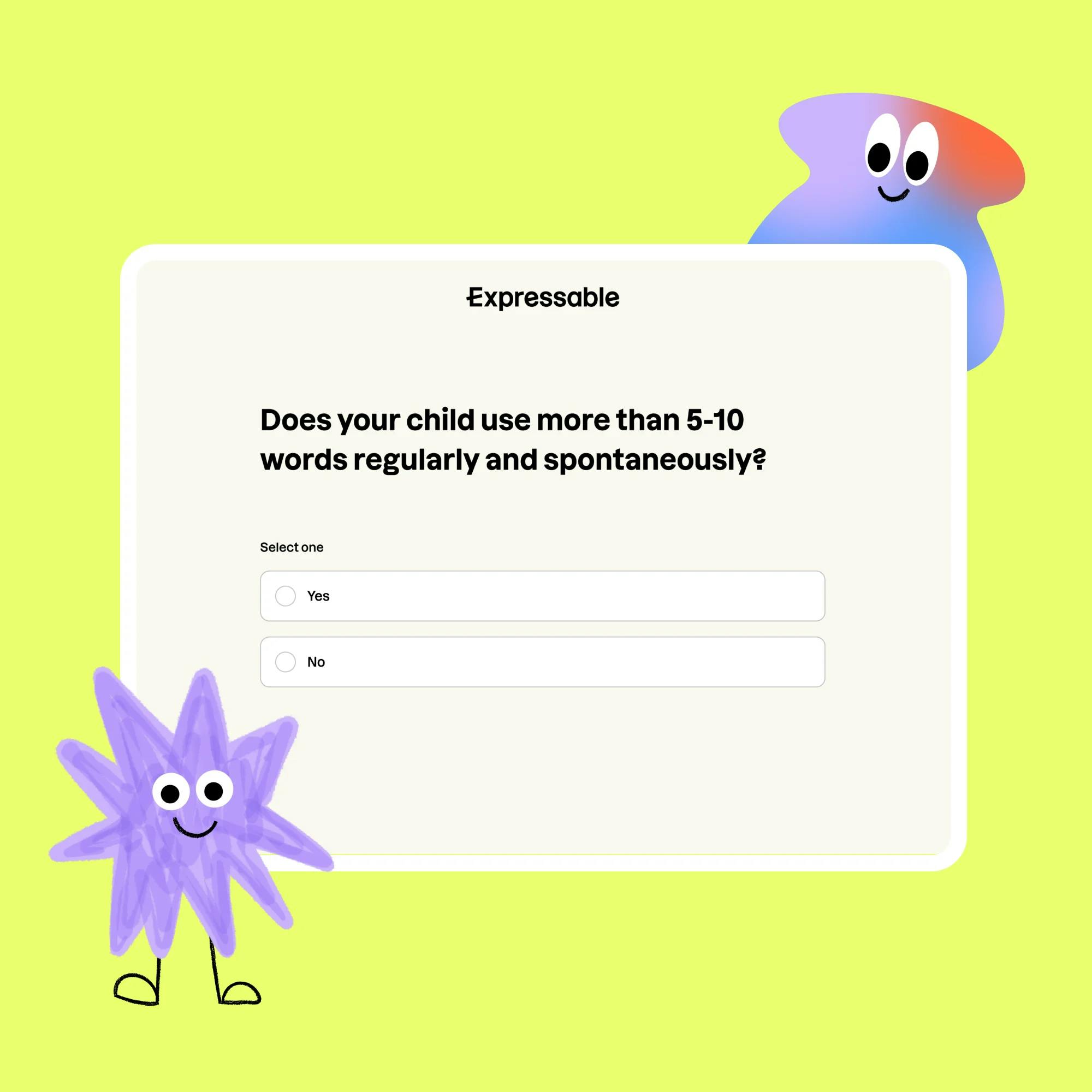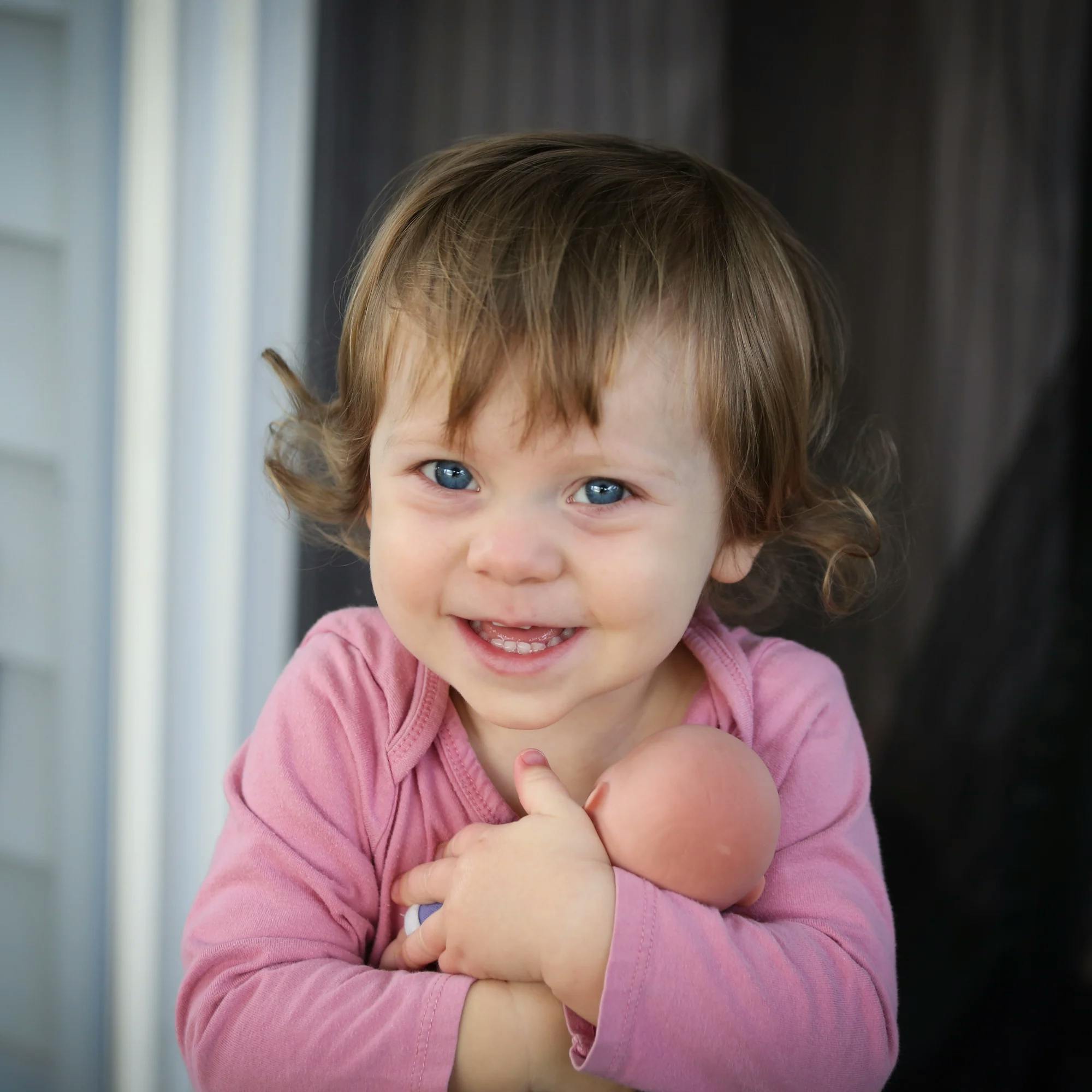If you have an 18-month-old at home, you may be wondering how many words your toddler should have. If your 18-month-old only says a handful of words, or they aren’t talking much at all, is that “normal”?
The first three years of a child’s life are filled with so much growth and development. And once toddlers start talking, you’ll typically begin seeing a big jump in the number of words they say. Let’s take a look at how many words an 18-month-old should say–and how they should be using those words. You’ll also learn how to help your child with their speech at home and when to consider speech therapy for your toddler.


Speech milestones for 18-month-olds
While all children develop communication skills at their own pace, it’s important to understand the speech and language milestones expected at certain ages.
When do toddlers start talking? Children typically say their first word somewhere around 12 months old. However, it could be a little earlier or later. By 18 months, you definitely want to have heard their first word. CDC guidelines state that children typically try to say at least three other words besides “mama” or “dada” by age 18 months.
Children typically say their first word somewhere around 12 months old.
Keep in mind that by age 24-30 months, we want toddlers to have at least 50 words in their expressive vocabularies. So as they grow, they should be steadily increasing the number of words they can say.
Babies and toddlers typically begin talking by labeling, or saying the names of, people and items. But as they start using more words more often, you’ll see them begin using those words in different ways. You’ll also hear your child start saying words on their own, instead of simply imitating you. Let’s talk a little more about what to expect from your 18-month-old’s speech.

What should your 18-month-old’s speech sound like?
Children learn to imitate the sounds and words you say before producing them on their own. While toddlers should still be repeating new words, they should begin to say words spontaneously as well.
For example, an 18-month-old should be able to say something like “milk!” when they’re thirsty, or “ball!” when they want to play. These are examples of functional words, which are used for a specific function, such as to ask for something. Toddlers talking in this way are beginning to make the connection that communicating helps them get what they want.
Your toddler should also start to use different consonant sounds in their words or babbles. The earliest developing sounds include /b/, /p/, /m/, /n/, and /d/. Children who are 18 months old should be able to produce most of these consonants by themselves. As they learn to say new sounds, this will help them pronounce new words more clearly.


How to help your toddler learn to talk
If you’re looking for a few easy ways to help your child at home, check out these 3 tips.
1 Model language for your child
One of the simplest and most effective things you can do for your kiddo is to model, or demonstrate, language for them. It’s easy: Just talk to them often, even if they don’t respond to you. Children learn so much from the people they spend the most time with. Your child can learn words, the meaning of words, and how to pronounce them simply by watching and listening to what you do!

2 Prompt your child to imitate you
Imitation abilities are important for a child’s speech and language development. If your child isn’t yet mimicking any sounds, spend some time practicing animal sounds, or the sounds of trains and cars. They tend to be fun and motivating for toddlers to copy!
Once your child is imitating these sounds, you can move onto speech sounds such as vowels and consonants–think simple babbles like “ma-ma.” As your child improves in this area, you can move on to simple word imitation.
If you’ve tried all of this and your child is still struggling with verbal imitation, try gesture imitation. Children have to learn to copy gestures and movements before moving on to speech. These can be simple gestures such as waving, blowing kisses, and clapping hands.
3 Play with your toddler every day
Here’s another simple tip to help with speech: Play with your child daily. Did you know that play supports communication skills? The more you play together, the more chances your child has to communicate with you about what’s happening, what they see, or what they’re enjoying. Play may not feel important to us adults, but it’s how little ones learn and grow. So make some time to get down on the floor and interact with your little one. You’ll be growing their language skills and having a blast together!


How do you know if your toddler needs speech therapy?
If your child is 18 months old and not gaining the skills discussed in this article, go ahead and contact a speech therapist. The speech therapist can evaluate your child and determine whether they would benefit from speech therapy.
There is no obligation to begin speech therapy if you have an evaluation. You can meet the speech therapist, hear their feedback, ask questions, and decide on next steps. The speech therapist will give you their formal recommendation.
If a child has a speech or language delay, the earlier they start speech therapy, the sooner they can start making progress!
Keep in mind, however, that if a child has a speech or language delay, the earlier they receive intervention, the sooner they can start making progress! Language development builds skill by skill, much like a staircase. You have to take each step one at a time to make it to the top. If a child doesn’t develop the skills that are next in line for them, they won’t be able to meet the skills that come after. That’s why it’s not always a good idea to “wait and see” when it comes to speech therapy.


How to find a speech therapist for your toddler
To find a speech therapist, start by talking to your child’s pediatrician. They will likely have some recommendations for speech therapists. They can also write a script for speech therapy if necessary.
If you’d like to explore using health insurance to pay for speech therapy, calling your insurance is a good idea. They can explain the process and suggest specific speech therapists who are in-network with your plan.
You can also call speech therapists or speech therapy practices yourself. They can walk you through the steps needed for an evaluation and beginning therapy.


What does speech therapy look like for an 18-month-old?
Speech therapy for toddlers focuses on using play to address therapy goals. After the evaluation, your speech therapist will create a treatment plan with specific goals for your child. These may be goals to imitate sounds or words, or to use a bigger variety of gestures or words on their own.
Whatever the goals are, your speech therapist will use play routines to motivate your child to complete their therapy tasks. Therapy will often involve music, games, and fun toys and activities like bubbles or crafts to keep little ones excited and engaged the whole time!
Your speech therapist will track your child’s progress and give you guidance and ideas for practicing at home. Home practice is key to your child continuing to learn and get closer to their goals. It can even help them “graduate” from speech therapy sooner! So partner with your speech therapist to identify exactly what you can do to support your child. With the two of you working together, your child will continue to grow their abilities to communicate and connect with others.
How Expressable Can Help
Concerned your child isn't reaching age-expected milestones? Looking for communication support from a professional? Expressable is a national online speech therapy practice serving children and adults. We treat all major areas of communication and feeding, offer flexible hours including evenings and weekends, and accept most major health insurance plans. We’re proud to have earned more than 3,000 5-star reviews from our clients (4.9/5 average).
Our therapy model is centered on parent and caregiver involvement. Research proves that empowering caregivers to participate in their loved one’s therapy leads to better outcomes. That’s why we combine live, 1-on-1 speech therapy with personalized education and home practice activities for faster progress.
Communication is more than words. It’s how we share how we feel and show who we are. We’re here to help you or your child do just that.
 Abby Barnes, M.S., CCC-SLP
Abby Barnes, M.S., CCC-SLP











